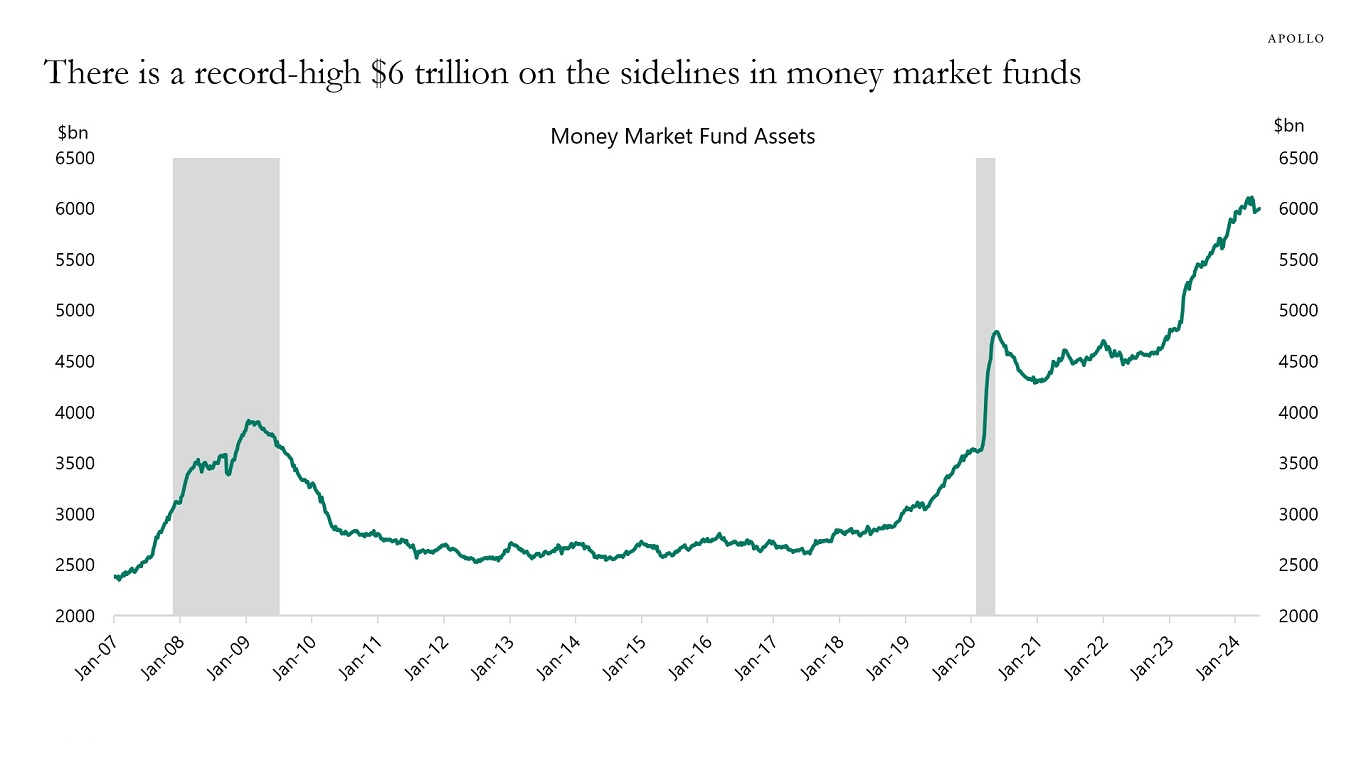j’ai un peu du mal à suivre le propos de votre article:
Every transaction in the market requires both a buyer and a seller, with the only differentiating factor being at what PRICE the transaction occurs. Since this is necessary for there to be equilibrium in the markets, there can be no “sidelines.”
et donc si ce cash se décide à rentrer sur le marché, il y aura une grosse pression acheteuse et un nouvel équilibre à des niveaux de prix beaucoup plus élevés non ?
Ensuite l’article continue comme quoi les allocations cash dans les portfolios sont faibles et que le pouvoir d’achat de ce cash est faible. OK $1 achete moins d’actions aujourd’hui qu’il y a 5 ans .. mais c’est quand même $6T ! on a eu des QE plus petits.
Just because I have money in a money market account doesn’t mean I am saving it for investing purposes. It could be an emergency savings account, a down payment for a house, or a vacation fund on which I want to earn a higher interest rate.
Also, corporations use money markets to store cash for payroll, capital expenditures, operations, and other uses unrelated to investing in the stock market.
Foreign entities also store cash in the U.S. for transactions processed in the United States, which they may not want to repatriate back into their country of origin immediately.
The list goes on, but you get the idea.
Furthermore, you will notice the bulk of the money is in Government Money Market funds. These particular types of money market funds often have much higher account minimums (from $100,000 to $1 million), suggesting these funds are not retail investors. (Those would be the smaller balances of prime retail funds.)
un peu faible comme explication : je ne vois pas pourquoi ces MMF ont soudainement beaucoup augmenté au dessus de leur tendance longue et qu’ils auraient vocations à RESTER alloués en cash (propos de l’article) - surtout après une prochaine baisse des taux. Les taux actuels sont le seul facteur que je vois qui justifie cette persistence en MMF. Les exemples donnés d’utilisation existent depuis toujours et n’expliquent pas ces afflux récents massifs en MMF. En plus si ce sont des instit. et non du retail, l’article auto-contredit la moitié de son raisonnement.
What Changes The Game
In the current bull market, few people are willing to sell, so buyers must keep bidding up prices to attract a seller to make a transaction. As long as this remains the case and exuberance exceeds logic, buyers will continue to pay higher prices to get into the positions they want to own.
Such is the very definition of the “greater fool” theory.
However, at some point, for whatever reason, this dynamic will change. Buyers will become more scarce as they refuse to pay a higher price. When sellers realize the change, there will be a rush to sell to a diminishing pool of buyers. Eventually, sellers begin to “panic sell” as buyers evaporate and prices plunge.
En gros, l’article dit que les prix vont monter si on reste en bull market .. mais attention la dynamique va changer, le cycle tourne ! Pourquoi, comment, on ne sais pas ..
Pas convaincu par cette simple histoire de cycle, on pourrait tenir ces propos en toutes circonstances donc leur valeur est à peu près nulle. C’est du même niveau que ’le ciel est bleu, je vous annonce de l’orage à horizon indéterminé"
EDIT les 6T ne sont PAS un mythe selon l’article .. simplement ils sont "neutralisés" selon eux
Dernière modification par KingFlan (28/06/2024 19h24)

![]() Hors ligne
Hors ligne


























